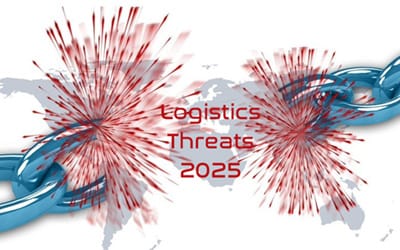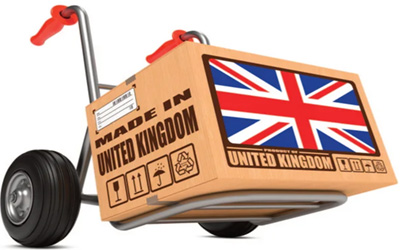Top 10 Biggest Threats to UK Logistics 2025 Revealed
The UK logistics landscape faces unprecedented challenges as we navigate through 2025, with threats ranging from Brexit’s ongoing impact to extreme weather disruptions. For freight forwarding companies and supply chain managers, understanding these risks and implementing proactive strategies is crucial for maintaining operational resilience and competitive advantage.
The UK’s £170 billion logistics sector employs over 8% of the nation’s workforce, making it a critical economic enabler. However, persistent inflation, elevated geopolitical tensions, and evolving regulatory requirements create a complex operating environment that demands strategic navigation.
1. Brexit Ongoing Impact and Trade Complexity
Brexit continues to disrupt UK EU trade relationships, with volume of products traded between the EU and UK decreasing by one fifth. Customs clearance delays, increased documentation requirements, and regulatory divergence create persistent operational challenges.
Navigation Strategy: Implement comprehensive customs clearance procedures and maintain detailed supplier documentation. Diversify trade routes beyond EU markets and establish alternative sourcing strategies to reduce dependency on politically sensitive regions.
 2. Extreme Weather and Climate Disruption
2. Extreme Weather and Climate Disruption
Climate change represents one of the most significant global risks to logistics operations. Flooding, droughts, hurricanes, and wildfires are disrupting global logistics hubs, with coastal infrastructure and transit routes particularly vulnerable to extreme weather events.
Navigation Strategy: Develop scenario planning with alternative routes and shipping options for high risk regions. Audit facilities to ensure they are flood resistant and heat resistant. Implement real time weather monitoring systems and maintain contingency plans for route diversions.
3. Energy Cost Crisis Impact
UK energy prices remain 42% higher than winter 2021/22 levels, despite recent decreases. Rising operational costs significantly impact transportation expenses, warehouse operations, and overall supply chain efficiency across the logistics sector.
Navigation Strategy: Invest in energy efficient technologies and consider renewable energy sources for warehouse operations. Implement route optimisation software to reduce fuel consumption and negotiate long term energy contracts to stabilise costs.
 4. Critical Skills Shortage Crisis
4. Critical Skills Shortage Crisis
The UK faces a shortfall of approximately 50,000 HGV drivers, with an aging workforce and Brexit related recruitment barriers exacerbating the situation. Skills shortages extend beyond drivers to include warehouse operatives and logistics specialists.
Navigation Strategy: Invest in comprehensive training programmes and offer competitive wages with flexible scheduling. Partner with training organisations and consider apprenticeship schemes to develop internal talent pipelines whilst exploring automation technologies for repetitive tasks.
5. Cybersecurity Threats and Digital Vulnerability
Hackers increasingly target logistics systems with ransomware and phishing attacks, disrupting operations from customs clearance to shipment tracking. Russia’s capacity to launch cyber attacks aimed at shutting down UK power grids represents a stark infrastructure risk.
Navigation Strategy: Strengthen cyber defences through regular system updates, implement multi factor authentication, and conduct staff training on phishing recognition. Perform regular cybersecurity drills and maintain offline backup systems for critical operations.
 6. Geopolitical Instability and Trade Disruption
6. Geopolitical Instability and Trade Disruption
Ongoing conflicts and tensions in regions like the Red Sea and South China Sea disrupt major trade routes. Trump’s new tariffs, including 25% on aluminium and steel imports, alter global trade patterns and increase transportation costs.
Navigation Strategy: Monitor real time geopolitical analytics to predict potential disruptions. Diversify sourcing across multiple regions and maintain flexible routing options. Establish relationships with carriers offering multiple service routes to avoid single point failures.
7. Supply Chain Visibility Limitations
Fragmented global supply chains make real time goods tracking difficult and complicate ethical sourcing verification. Limited visibility creates communication gaps between suppliers and increases response times during disruptions.
Navigation Strategy: Implement advanced tracking systems like Multi Freight System platforms that integrate seamlessly with partners. Establish clear communication protocols for sharing updates across suppliers and
invest in digital visibility tools.
 8. Rising Operational Costs Pressure
8. Rising Operational Costs Pressure
The cost of operating an HGV has risen by 10% over the past year, placing significant financial constraints on logistics operators. Smaller operators face particular challenges, with many running at loss levels due to razor thin margins.
Navigation Strategy: Conduct regular cost analysis and implement efficiency measures across all operations. Consider collaborative logistics arrangements with other operators to share costs and explore government support schemes for operational assistance.
9. Last Mile Delivery Challenges
Consumer demand for faster, cheaper deliveries creates bottlenecks in urban logistics. With 78% of consumers expecting same day or next day delivery, urban congestion, labour shortages, and rising fuel costs compound delivery challenges.
Navigation Strategy: Establish micro fulfillment centres closer to customers and experiment with innovative delivery solutions. Implement route optimisation technology and consider partnerships with local delivery services for last mile efficiency.
 10. Technology Integration Barriers
10. Technology Integration Barriers
Legacy systems and fragmented IT infrastructures hinder adoption of advanced logistics technologies like AI and blockchain. High integration costs and cybersecurity concerns prevent many companies from modernising their technology platforms.
Navigation Strategy: Start with pilot AI driven projects such as demand forecasting or route optimisation.
Create annual budgets for technology upgrades and prioritise systems that offer immediate operational benefits whilst planning longer term digital transformation.
Building Resilience Through Strategic Planning
Successfully navigating 2025’s logistics threats requires proactive risk management and strategic adaptation. Companies must prioritise threats most relevant to their operations whilst building operational flexibility to respond to unexpected disruptions.
The logistics industry’s future depends on embracing technology, maintaining operational agility, and developing comprehensive risk mitigation strategies. Companies that invest in resilience today will be best positioned to capitalise on opportunities as market conditions stabilise.
Collaborative Risk Management
 Consider partnerships with specialist freight forwarding companies that offer expertise across multiple threat areas. SARR Logistics’ experience in dangerous goods declarations, supply chain mapping, and international trade provides valuable support for companies navigating complex risk environments.
Consider partnerships with specialist freight forwarding companies that offer expertise across multiple threat areas. SARR Logistics’ experience in dangerous goods declarations, supply chain mapping, and international trade provides valuable support for companies navigating complex risk environments.
For expert guidance on navigating 2025’s logistics challenges, SARR Logistics offers comprehensive freight forwarding services designed to address today’s complex operational environment. Our expertise in air freight forwarding, customs clearance, and supply chain optimisation helps businesses maintain resilience whilst reducing costs.
Contact our experienced team at [email protected] or call 0333 224 1 224 to discuss how we can support your logistics operations through these challenging times. From initial consultation to ongoing operational support, SARR Logistics provides the expertise and attention to detail your business deserves.
Conclusion
The ten threats outlined above represent the most significant challenges facing UK logistics operations in 2025. From Brexit’s ongoing complexity to extreme weather disruptions, these risks require proactive management and strategic planning to maintain operational continuity.
Success in this challenging environment depends on building operational flexibility, investing in appropriate technology, and maintaining strong supplier relationships. Companies that take action now to address these threats will be better positioned to capitalise on opportunities as market conditions evolve.
Remember, the future of logistics isn’t about avoiding risks completely but navigating them with intelligence, preparation, and agility. By understanding these threats and implementing appropriate mitigation strategies, logistics operators can maintain competitive advantage whilst building long term resilience.
FAQ
What is the biggest threat to UK logistics in 2025?
Brexit’s ongoing impact remains the most significant UK specific threat, with continued trade complexity, customs delays, and regulatory divergence affecting daily operations. Combined with skills shortages and rising costs, Brexit creates compound challenges that require comprehensive mitigation strategies.
How can small logistics companies compete with rising operational costs?
Small operators should focus on operational efficiency through technology adoption, collaborative partnerships, and niche specialisation. Consider shared logistics arrangements, government support schemes, and investment in route optimisation technology to maintain competitive margins whilst delivering exceptional service.
What role does technology play in managing logistics threats?
Technology serves as the foundation for modern threat management, providing real time visibility, predictive analytics, and automated compliance monitoring. Investment in tracking systems, cybersecurity measures, and AI-driven optimisation tools helps companies respond quickly to disruptions whilst maintaining operational efficiency.
How important is supply chain diversification for UK companies?
Supply chain diversification is critical for reducing dependency on single regions or suppliers. Companies should establish relationships across multiple geographic areas, maintain alternative sourcing options, and develop flexible routing capabilities to respond effectively to geopolitical or climate related disruptions.
When should companies seek professional logistics support?
Companies should consider professional freight forwarding support when facing complex international requirements, regulatory compliance challenges, or capacity constraints. Specialist providers offer expertise in customs clearance, dangerous goods handling, and route optimisation that can reduce costs whilst improving service reliability.
SARR Logistics UK
With a legacy built on trust, backed by extensive experience, a global network, and a customer centric approach, SARR Logistics UK emerges as the ultimate partner as with Amazon to offfer our customers the delivery service to Amazon warehousing a service most indipendant freight forwarders do not offer.
If you would like to know more reach out to us today and experience a seamless, efficient, and dependable shipping solution tailored to elevate your business. For further inquiries and to explore how SARR Logistics UK can help you save money contact our team. We are always happy to help.![]()



 2. Extreme Weather and Climate Disruption
2. Extreme Weather and Climate Disruption 4. Critical Skills Shortage Crisis
4. Critical Skills Shortage Crisis 6. Geopolitical Instability and Trade Disruption
6. Geopolitical Instability and Trade Disruption 8. Rising Operational Costs Pressure
8. Rising Operational Costs Pressure 10. Technology Integration Barriers
10. Technology Integration Barriers





